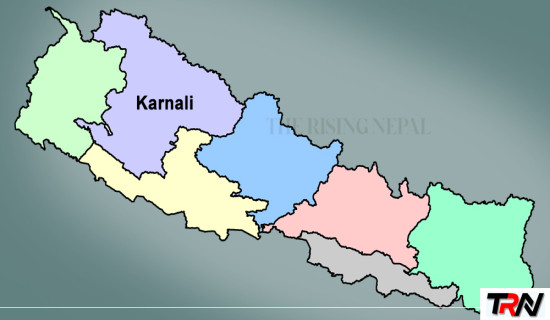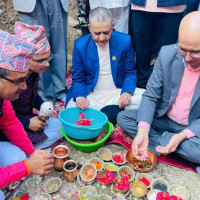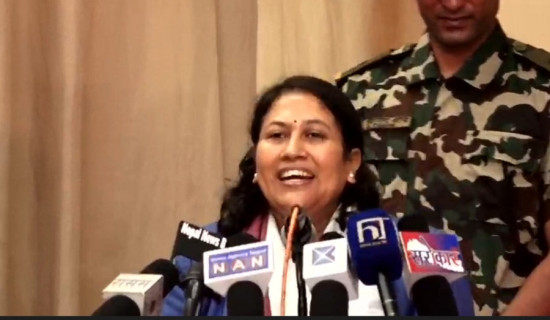- Sunday, 1 September 2024
‘We are committed to inclusive development’
Devghat Rural Municipality in Tanahun district is filled with historical, religious, cultural and natural heritages. It is also rich in natural diversity as the Kaligandaki, Trishuli, Seti and Madi rivers flow through the rural municipality. Additionally, Devghat Dham, a sacred place for all Hindu devotees, is in this municipality.
Devghat Rural Municipality was formed by merging four former village development committees-- Kota, Baidi, Chhipchhipe and Devghat. Furthermore, wards of the former village development committees were also combined, resulting in a total of five wards in the entire rural municipality.
The rural municipality borders with Bharatpur Metropolitan City of Chitwan, Gaidakot Municipality of Nawalpur district and Rishing Rural Municipality, Bandipur Rural Municipality, Anbukhaireni Rural Municipality and Byas Municipality of Tanahun district.
Til Bahadur Thapa of the Nepali Congress was elected Chairman of the rural municipality in the 2022 local election. Our Tanahun correspondent Amar Raj Naharki recently talked to Chairman Thapa focusing on his development programmes. Excerpts:
What changes have you implemented in Devghat Rural Municipality after assuming the office of chairman?
First, the projects initiated by the people’s representatives after the state restructuring have been completed. An integrated education programme has been implemented by preparing a plan. Campaigns have started for the sustainability and promotion of traditional agriculture systems. Service delivery has been made tech-friendly and expanded to the ward level. We are monitoring projects, and road networks are being upgraded. We are focused on improving the economic, social and educational status of the people.
What major challenges have you faced while working?
Due to unclear laws, the implementation of planned projects faces problems. Decision-making has been affected due to jurisdictional clashes among federal, provincial and local level governments. Development works could not be accelerated as expected due to biased budget allocations by political leaders. Additionally, problems arise due to a lack of coordination between the federal and provincial levels even if we have a budget.
The majority of people in this rural municipality live in remote areas and are involved in agriculture. They also lack access to transportation facilities. What are you doing in favour of them?
Although the road network has been expanded to remote areas, targeted benefits could not be achieved as sustainable roads have not been constructed. However, agricultural products from the rural areas are partially being successfully supplied to urban markets swiftly and efficiently. There is diversity in the rural municipality, and we are making continuous efforts to serve its people by maintaining political, social and geographic balance. We are making maximum use of resources in the rural municipality.
What changes have been made in the education sector?
An integrated education programme has been implemented according to the education plan incorporating education, health and agriculture. Policies that promote earning while learning by integrating practical education have been introduced. We have a plan to include this subject in the local curriculum.
What are your main plans for the future?
Promoting agriculture and tourism and introducing programmes that transform cultural and social traditions into livelihoods are my plans. Similarly, I have a plan to introduce basic technical education programmes at the primary school level. Developing sustainable road infrastructure and modernising traditional agricultural systems to create employment opportunities are other plans. Similarly, I will introduce programmes to resettle those displaced from villages back in the villages.
What steps have you taken to promote the religious values of Devghat?
For the development of Devghat as a religious tourism destination, essential pathways and infrastructures have been constructed from the confluence of the Beni River to Pyauligadhi Sinchanggadi passing through Charchare waterfall and Ghantachuli of Paluraja Temple. However, due to low budget allocation, targets could not be achieved.
Prosperity could not be achieved without good governance. What have you done to maintain transparency and ensure the availability of easy services to people?
Capacity building of representatives and employees has been prioritised. The completed works have been publicly reviewed and monitoring has been enhanced effectively. Arrangements have been made to deliver services at the ward level.
What would you like to say something in conclusion?
Devghat Rural Municipality is characterised by its remote geography surrounded by three rivers. The geographical terrain of steep land and limited plains offers significant potential for ecotourism. There is great potential for growing fruits like oranges, lime and litchis. Meanwhile, every elected local representative after state restructuring has focused on modernising the agriculture and tourism sectors.
Due to the clean climate and many natural, religious cultural and social resources, there is a possibility to develop and bring prosperity through tourism and agriculture. In the future, we will give priority to creating jobs in the agriculture and tourism sectors. All political parties and organisations have supported the rural municipality. If we all move forward together, the development of Devghat can be achieved. We are committed to inclusive development for everyone here.




-(1)-square-thumb.jpg)



-square-thumb.jpg)


-original-thumb.jpg)




